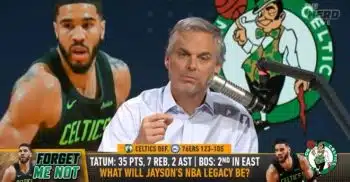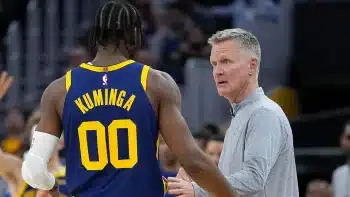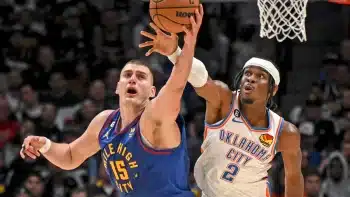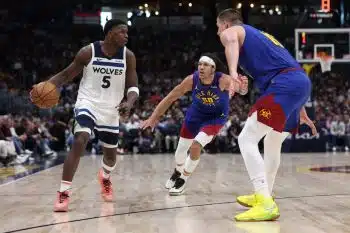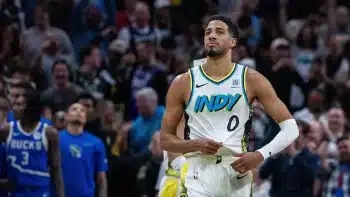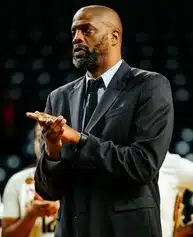NBA
Fixing the Minnesota Timberwolves
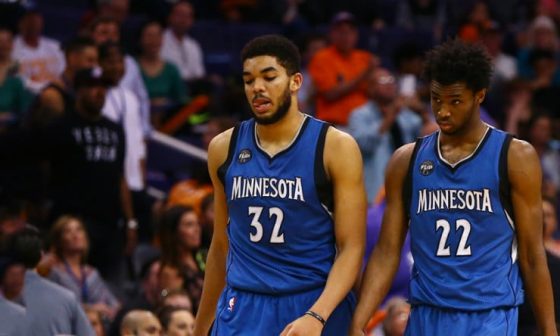
Today in Basketball Insiders’ continuing offseason series, we tackle the Minnesota Timberwolves.
However, unlike many other NBA teams, the Wolves don’t necessarily need to be “fixed.” This young Minnesota squad needs some tweaking, but “patience” should be the overriding theme for the Timberwolves this summer. The team certainly needs to improve, but much of that growth and improvement will hopefully develop organically.
Don’t Rush the Rebuild
It’s difficult to find a more promising core in the NBA today. The foundation’s centerpiece is Karl-Anthony Towns. Coming into his rookie season, expectations were sky-high for the number one overall pick in the 2015 NBA Draft. However, KAT exceeded even the loftiest of expectations by putting together one of the more impressive rookie campaigns in recent memory. He finished the season averaging 18.3 points, 10.4 rebounds and 1.7 blocks, setting franchise rookie records in all three of those categories in the process. He posted a PER of 22.5, which ranks as the fifth-highest PER by a rookie since the merger – behind only Michael Jordan, David Robinson, Shaquille O’Neal and Tim Duncan. Still just 20 years old, it’s not a stretch to argue Towns is the most valuable and prized young big man in the NBA today.
Andrew Wiggins is still just a puppy as well, turning 21 back in late February. He finished his second NBA year as Minnesota’s leading scorer, ranking 19th in the league at 20.7 points per game. In addition, he was a far more efficient scorer and played the best ball of his young career over the final three months of the season; Wiggins’ field goal percentage jumped to 48.9 percent after Feb. 1, including 40 percent (30-for-75) from long distance.
The tandem of Wiggins and Towns has Minnesotans giddy, envisioning the possibilities of greatness in the not-too-distant future. Per NBA.com, entering 2015-16, only 31 players in NBA history had ever averaged at least 15 points in their age-19 or age-20 seasons. The Wolves became just the second team ever to feature two such players in the same season, joining the 2008-09 Oklahoma City Thunder (Kevin Durant, Russell Westbrook). Wiggins joined Durant, Carmelo Anthony, Kobe Bryant and LeBron James as the only players to accomplish that feat in both their age-19 and age-20 seasons.
Zach LaVine (also 21 years old) is the other youngster making up the Wolves’ precocious core. No longer known strictly as a dunker, LaVine showcased vast improvements over the second half of the 2015-16 campaign. (More on that later.)
Last January, Minnesota became the first team in the history of the NBA to have three players, all under 21, score at least 20 points in same game.
And now, these prodigies will learn from one of the better young coaches in the NBA. Minnesota was able to snag the most sought after free-agent coach on the market in Tom Thibodeau, who’s a proven defensive mastermind.
The moral of the story is that the future in Minnesota is exceptionally bright. Thus, the focus of the organization should be staying patient as they slowly but soundly build around this exceptional core (specifically the two franchise cornerstones of Towns and Wiggins).
The Wolves are not winning a title next season. Consequently, there is no need to rush the rebuild. In practical terms, avoid the temptation to make a major splash by overpaying to lure a big name in free agency, which may result in tying up cap space long-term on pieces that may not fit.
While it’s important to improve, have these young guns get tested and gain valuable experience by getting a taste of games with playoff implications, that should be the result of natural progression as opposed to overzealous hastening of the timeline.
Rounding out the Roster: Add Shooting and Defense
The Timberwolves have 11 players with guaranteed contract for the 2016-17 season, which is tied for the most in the NBA. Minnesota is looking at approximately $25 million in cap space to spend this summer.
The Wolves’ primary priority should be adding shooters. As a team, Minnesota knocked down just 455 three-pointers (on 33.8 percent shooting) last season – the second fewest number of made triples in the entire league. To put that in context, Steph Curry and Klay Thompson made 678 three-pointers last season.
The only Timberwolf on the roster to make more than 65 threes last year was Zach LaVine. The encouraging news is that LaVine has showed tremendous improvement as a shooter (this may be related to the Wolves’ decision to take away the ball-handling responsibilities and play more frequently alongside Ricky Rubio).
Over the first 50 games of his rookie season in 2014-15, LaVine shot just 27.5 percent from three-point territory (20-of-71).
Over his final 50 games last season, LaVine shot 43.3 percent from behind the arc (87-of-202).
Consider this: In the games played following the 2016 All-Star break, LaVine was one of only five players players to make at least 60 three-pointers and shoot above 43 percent from behind the arc: The other four were Steph Curry, Klay Thompson, C.J. McCollum, and J.J. Redick.
Nonetheless, the Wolves still desperately need to add more players who are capable of knocking down long-range jumpers. It’s imperative they bring in shooters to space the floor, which will allow Towns to dominate on the low block. Without floor-spacers, Towns will eventually get swarmed by double- and triple-teams.
The elite shooting guards on the market this summer are Bradley Beal (restricted) and DeMar DeRozan. Some other free agent options for the Wolves to consider this summer include Kent Bazemore, Evan Fournier, Jamal Crawford, Eric Gordon, Courtney Lee, Luol Deng, Joe Johnson, Allen Crabbe and Ryan Anderson.
Also, the Wolves will have a high lottery pick, likely drafting in the top-six. Might they target a sharp-shooter such as Buddy Hield?
Another area that requires dramatic improvement is Minnesota’s team defense. They were near the bottom of the league in many defensive categories last season. They ranked 27th in the NBA in defensive efficiency, allowing 107.1 points per 100 possessions.
It’s likely safe to assume that Coach Thibodeau will be eager to focus on that end of the floor. His arrival should lead to an immediate, concerted effort to make the Wolves far more aggressive defensively.
With that in mind, it will be interesting to see how Minnesota approaches free agency and the draft. With Thibs calling the shots on personnel decisions, will the Wolves focus on defensive-minded players?
The future is undeniably bright in Minnesota. Now, the pressure is on the Timberwolves to ensure that they keep improving and growing the right direction.
